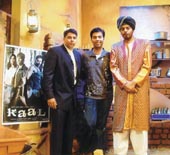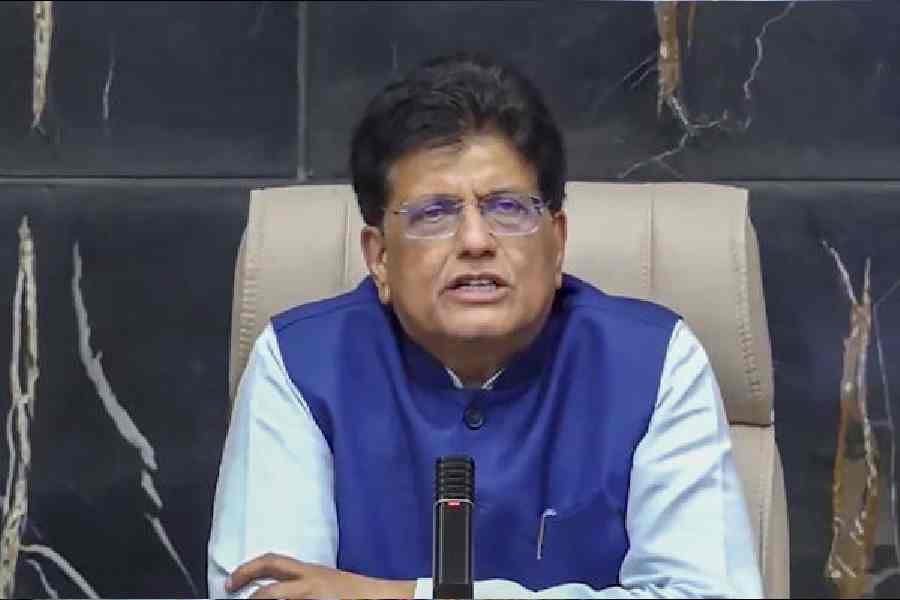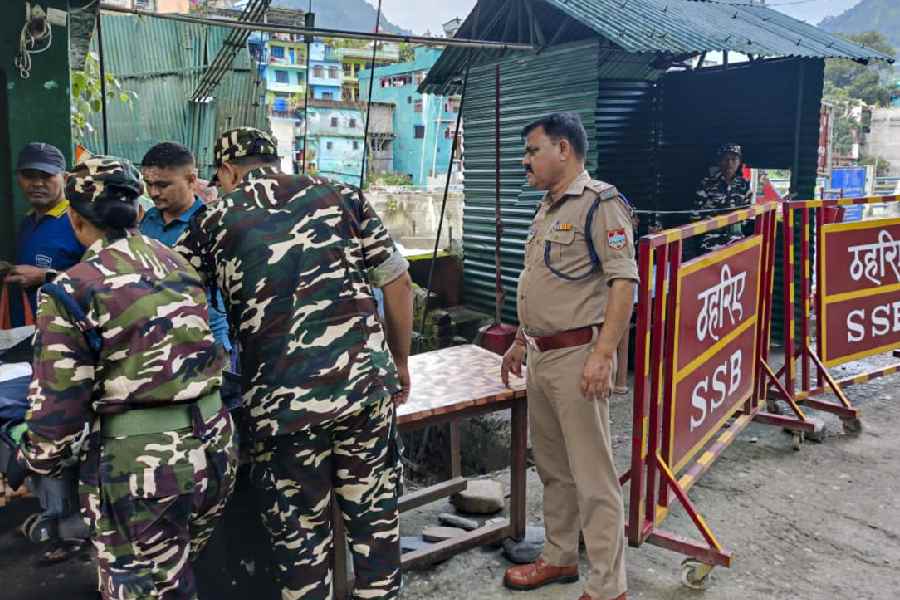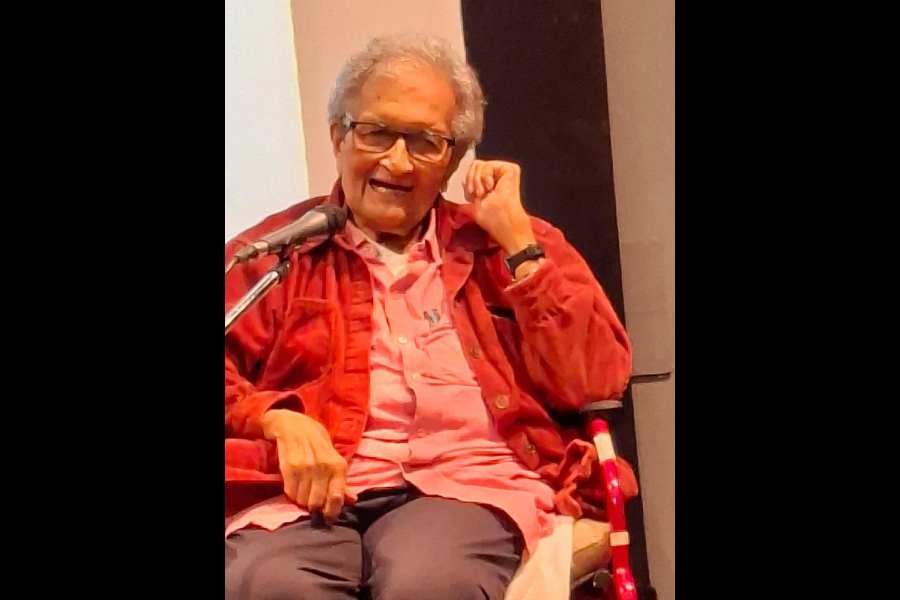 |
| BRAVEHEARTS: Shakila Baby (right) delivers a punch and below (centre), Razia Shabnam Pix: Subhendu Chaki |
 |
The bulbs blaze down on them. On the makeshift boxing ring with a metal sheet for a roof, the girls in T-shirts and shorts are locked in a clinch, their foreheads glistening with sweat. A seemingly enthralled crowd watches the women boxers engaged in a friendly match at Calcutta’s Deshapran Shasmal Park. As they break into a cheer, the referee, a short, wiry girl, comes up and pulls them apart.
The match over, 17-year-old Shannu Baby and Shakila Baby ? twin sisters who are challengers in the ring ? change quickly into the conventional salwar kameez. Waving to referee Razia Shabnam, who is also their coach, they step out of the park, walk a little distance, and then hop onto a passing tram.
The girls argue about the “jabs and punches” as the tram trundles along. At Ekbalpore, a Muslim-dominated neighbourhood dotted with dingy slums and gambling and hooch dens, the girls leap off. Walking gingerly past the mangy dogs and the burqa-clad women shuffling along narrow lanes, they approach what looks like a dreary tenement and knock on the door of a ground-floor flat.
A woman opens it a crack. “Mummy, we are back,” says Shannu, pushing the door in and throwing her arms around her mother. Like several other Muslim girls from the area, Shannu and Shakila, two of the six children of widowed Shannu Begum, have taken up boxing ? as much to escape poverty as to find themselves. But then, giving up burqa for shorts and T-shirts is not an easy thing to do, as the girls have learnt to their cost.
“When our father was alive, he hated the idea of us boxing. He used to abuse us and once even beat us with shoes for refusing to give it up,” says Shannu. After his death, their brothers started objecting. “If it weren’t for our mother, who stood by us, we wouldn’t be boxing today,” Shannu, the older of the two sisters by 30 minutes, says.
When Razia Shabnam, also of Ekbalpore, took up boxing in 1998, neighbours jeered at her parents, saying they were trying to “make a boy out of her.” Some even accused her parents of going against Islamic tenets and the Islamic way of life. Though Shabnam’s father Rahat Hossain, a social worker, was “extremely supportive” and refused to pay attention to the taunts from neighbours, he did ask his daughter to wear traditional clothes rather than track suits to her boxing club.
“Our neighbours objected to my wearing a track suit. They would have surely ostracised my family if I had worn shorts to the ring,” Shabnam, 26, says.
Seven years on, things haven’t changed much for Shabnam, no longer single. Neighbours and friends now taunt her husband, Mohammad Faiyaz, about the fact that he has married a boxer who can barely cook and has little time for household chores. “But my husband supports me all the way,” says Shabnam, now a boxing coach and international referee.
The Ekbalpore women were drawn to boxing after watching local young men in action at the neighbouring Kidderpore School of Physical Culture, where Shannu and Shakila first tasted “the power of boxing” as three-year-olds. Their interest grew after Mohammed Ali Qamar, a local youth, won a gold medal at the 2002 Commonwealth Games.
According to Asit Banerjee, president of the Bengal Amateur Boxing Federation, many of these girls see boxing as a passport to success. “They feel boxing will help them escape poverty at home and break down the stifling social barriers,” says Banerjee, who runs the South Calcutta Physical Culture Association at Deshapran Shasmal Park, where the women boxers practise.
In other words, the girls donning the boxing gloves want a job. Little wonder that many get disillusioned before long. Shabnam says the rookies from Ekbalpore often see boxing as “a kind of computer course.” They drop out when they don’t get a job after, say, six months of training.
“It’s increasingly becoming difficult to keep them in the club as there are hardly any job opportunities for women boxers,” she says. Alam Araf, Noor Afroz and Sajida Pervin, the young hopefuls hovering around Shabnam, nod in agreement. To retain his girl students, Banerjee had long fought the boxing federation to recognise women as coaches. His effort paid off in 2001 when the Sports Authority of India admitted a group of young women, including Shabnam, to train them as boxing coaches.
“Women’s boxing in India would not have survived without women coaches,” says the 62-year-old boxing official, who has 22 women, most of them Muslim, undergoing training in his club right now. Shabnam says having women coaches has increased women’s participation in boxing, particularly from Muslim families. “It’s now easier to convince the parents, especially from conservative families, to let their daughters box,” she says.
But it’s not just the social restrictions that constrict the women boxers from the minority community. Money, or the lack of it, is often a major limiting factor. Banno Begum, for instance, always resisted the pressure from her community to take her daughters off boxing because she believed in “letting the children pursue what they wanted.”
Besides, she hoped boxing would help her daughters “find their feet” and lift the family out of poverty. Yet, the 48-year-old widow, who depends chiefly on the meagre income of her two sons to run her 10-member family, is increasingly finding it difficult to pay for her daughters’ expenses. “I have to spend a lot on their food and uniform. I give them Rs 50 a day just for snacks and bus fares. I don’t know how long I will be able to afford this,” she says with a sigh.
Even for Shabnam, things are no different. The gritty woman, the first in her neighbourhood to go to college and earn a degree, does not earn “a paisa” from boxing. “I never get paid as a coach or a referee,” she discloses.
Even though her husband, who sells mobile phones at Kidderpore’s Five-Star market, gives her money whenever she asks for it, she feels ashamed to “stretch out” her hand every now and then. “But I need money for bus fares at least,” she says.
Shabnam doesn’t know what to say when parents of young women boxers confront her with angry words. “They want to know what future their daughters have as boxers when I didn’t get a job even after I became an international referee and visited countries such as Russia and Turkey,” she says.
But despite that, Shabnam presses on. For she has a mission. She wants to make champions out of Ekbalpore girls like Shannu and Shakila. Not just as boxers, but as “strong and independent” women, who can deliver a knockout punch to a society that tries to keep them down.










